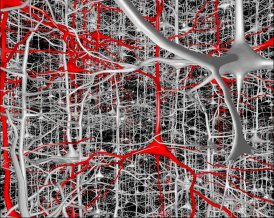Silicon Brain Can Simulate Day in One Second
Since the neurons are so small, the system runs 100,000 times faster than the biological equivalent and 10 million times faster than a software simulation. “We can simulate a day in one second,” Meier notes. _NW

The EU is sponsoring an ambitious silicon brain project called FACETS.
The FACETS project aims to address the unsolved question of how the brain computes with a concerted action of neuroscientists, computer scientists, engineers and physicists. It combines a substantial fraction of the European groups working in the field into a consortium of 13 groups from Austria, France, Germany, Hungary, Sweden, Switzerland and the UK. Since September 2005 more than 80 scientists join their efforts over a period of 4 years._FACETS.The groups have completed a "stage 1" silicon brain with 300 neurons and a half million synapses on a single chip. Stage 2 development is underway for a brain chip containing 200,000 neurons and 50 million synapses. The nearer term goals are not to replace the human brain with a chip, but rather to use the unique strengths of brain-type reasoning -- at ultra high silicon speeds -- to supplement the data processing, analysis, and computational abilities of more conventional super computers.
To build it, the team is creating its network on a single 20cm silicon disk, a ‘wafer’, of the type normally used to mass-produce chips before they are cut out of the wafer and packaged. This approach will make for a more compact device.As impressive as this effort appears, the end result of the project will come nowhere near the complexity or specific competencies of the human brain. But they will add enormous variety and capacity to our current computational skills. One more step toward androids that can emulate humans convincingly.
So called ‘wafer-scale integration’ has not been used much before for this, as such a large circuit will certainly have manufacturing flaws. “Our chips will have faults but they are each likely to affect only a single synapse or a single connection in the network,” Meier points out. “We can easily live with that. So we exploit the fault tolerance and use the entire wafer as a neural network.”
...Practical neural computers could be only five years away. “The first step could be a little add-on to your computer at home, a device to handle very complex input data and to provide a simple decision,” Meier says. “A typical thing could be an internet search.”
In the longer term, he sees applications for neural computers wherever there are complex and difficult decisions to be made. Companies could use them, for example, to explore the consequences of critical business decisions before they are taken. In today’s gloomy economic climate, many companies will wish they already had one!
The FACETS project, which is supported by the EU’s Sixth Framework Programme for research, is due to end in August 2009 but the partners have agreed to continue working together for another year. They eventually hope to secure a follow-on project with support from both the European Commission and national agencies. _Nanowerk
Labels: artificial intelligence, silicon brain

0 Comments:
Post a Comment
“During times of universal deceit, telling the truth becomes a revolutionary act” _George Orwell
<< Home